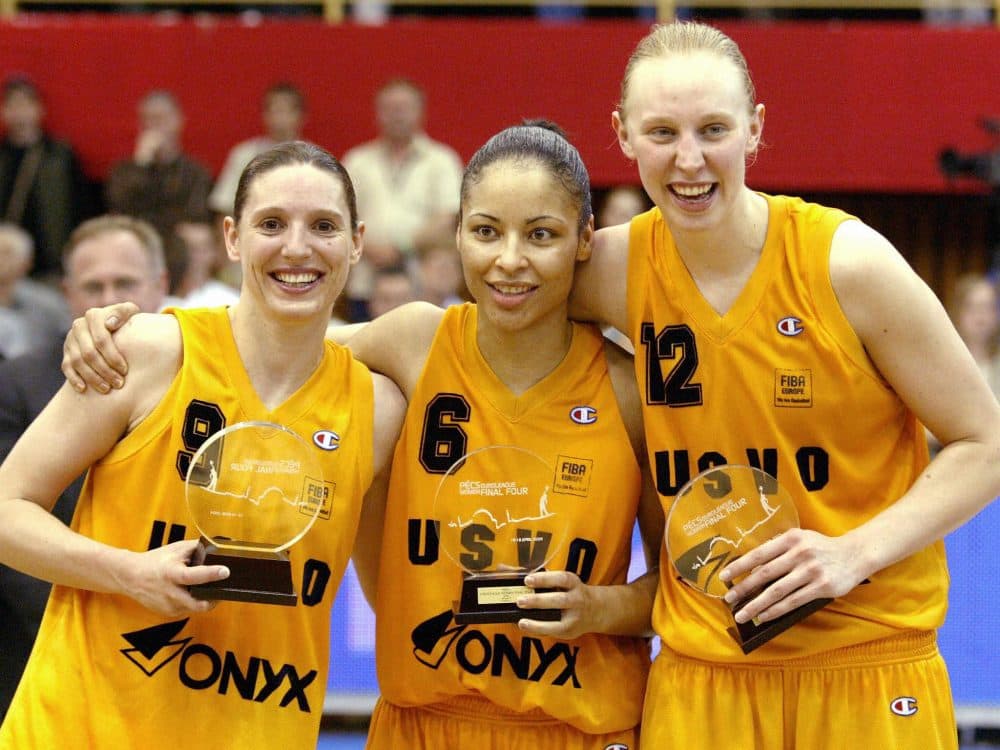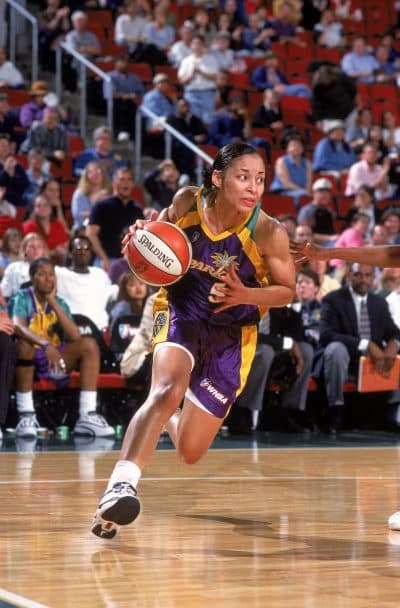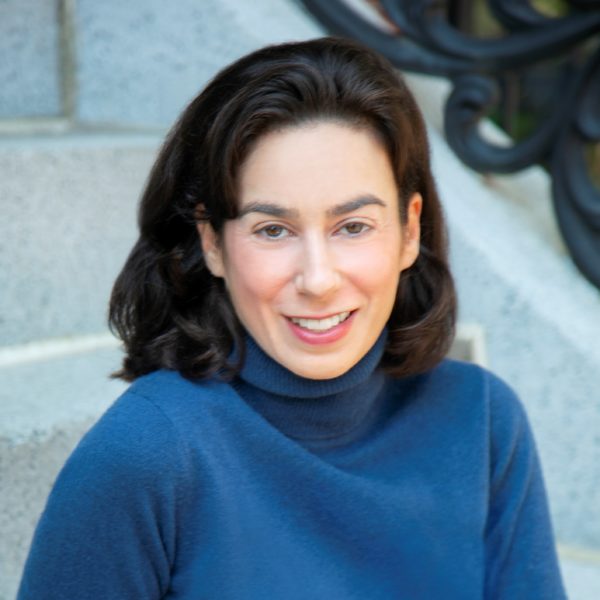Advertisement
Allison Feaster: Life As A Pro Basketball Player ... And Mom ... Overseas
Resume
Los Angeles, Charlotte, Valencia, León, Girona, Alcobendas — those are just some of the stops during Allison Feaster's professional basketball career.
All together, there were two continents, five countries and 12 cities.
"Did you ever think that you'd play professional basketball for as long as you did?" I ask her. "I mean, it was what? An 18 — am I counting? Can I count right? It’s an 18 year career?"
"It was an 18 year career," Feaster says. "No, I did not think I would be playing professional basketball at all, and for so long."
The Game That Started The Journey
As a Harvard senior, Feaster led the nation in scoring. But...
"Because you're coming from the Ivy League, it's like those numbers don't matter — those results don't matter," she says.
She thought her basketball career would end after college.
"I had a job offer to be an equities analyst at Merrill Lynch on Wall Street," she explains. "And just so happens that this job offer coincided with, I guess, one of the most important games in collegiate basketball history — at least for the Harvard folks."
It was 1998. The Harvard women's basketball team was a No. 16 seed in the NCAA Tournament. Stanford was a No. 1 seed.
They met in the first round. And the game was nationally televised.
For the first and only time in NCAA Tournament history, a No. 16 seed upset a No. 1 seed. And Feaster dominated, finishing with 35 points, 13 rebounds and three steals in 39 minutes.
"That played a huge part in just me being respected as a player," she says. "I got a little bit of exposure and was able to be drafted into the WNBA and decided to pursue a professional playing career instead of going to work on Wall Street."
Life In The Pros
Fast forward seven years. Feaster is married to her high school sweetheart, Danny Strong. And she is playing summers in the WNBA and winters overseas. Women typically play year-round to make a living.

"I had just finished a season in France," she says. "We just won the French title. And, as [was] customary, I would get on a plane the next day or two after the last game and report to my WNBA team. And when you arrive in your WNBA city — which was Charlotte at the time — you have to go have a physical. And in my physical, the doctor confirmed that I was a few weeks pregnant.
"I was ecstatic. We were ecstatic, but at the same time, you have to really consider the professional ramifications of being pregnant: How am I going to manage this pregnancy? Continue to play? For how long? Where will I give birth? Which continent? I would have to stop playing in Europe for a season. That was my livelihood. So it was a mixture of excitement coupled with uncertainty.
"The doctors immediately said, 'You know, you can continue with your lifestyle that you maintained before the pregnancy.' And I really took that and ran with it."
So she played almost the entire WNBA season, staying in the lineup as a starter until she was four months pregnant.
It wasn't until Feaster began cutting her compression shorts to make them fit that she considered taking maternity leave.
'There Is Always Pressure To Not Miss Out'
After the WNBA season, she joined her husband in Europe.
On Feb. 2, 2006, Feaster went to the gym, as usual, for a workout. The next morning, her daughter, Sarah Aleece Strong, was born in a suburb of Madrid, where her husband was playing professional basketball.
It wasn't long before Feaster was back to training for her next WNBA season.
"And was there any pressure to keep playing?" I ask. "Just concerns about keeping your job, keeping your place in a rotation — whatever that may be?"
“Absolutely. Absolutely." she says. "I think if you're an elite level athlete, I think there is always pressure to not miss out, to not take a break, to play through the pain. I think that’s one of the reasons why I rushed back from pregnancy. Because it's your livelihood, and the moment you are not around, it's a lot easier to be forgotten.
"I do remember my first game back. It was against — I think it was the Indiana Fever. And my knee was killing me, and I had no lift. I could barely jump and I started the game, but I didn't play much the remainder of the game. And I remember trying to — in my head this was probably a good idea, but at the time it was awful. I was gonna take a three-point shot with Tamika Catchings — who was one of the most athletic, dynamic, one of the best players to ever play the game — but I decided to take a three-point shot with her maybe an arm's length or two arms’ length away, and she stuffed it. She made me eat it. That was kinda the epitome of 'You're not ready to play.'"
"It's kind of a cruel welcome back," I say.
"It was," Feaster says with a laugh. "But sports are filled with those moments."
Back To Europe
Despite a rough return to pro ball, Feaster decided to play year-round and headed to Europe after the WNBA season. That meant moving overseas with Sarah in tow.
And for Feaster, as one half of a couple with two professional basketball players, bigger challenges were coming.
Travel, language barriers, time apart from her husband, who often played on different teams in different countries.
“My husband is pretty practical and he understands the role that a mother plays in a young child’s life, especially, and it was just an unspoken: she’ll stay with me when we have to be apart,” Feaster says.
Danny retired from playing in 2011, moved back to the U.S. and started a new career as a high school coach.
Feaster continued competing in Europe.
“It got more complicated once Sarah began to grow a bit older,” she says.
By then, Feaster was in her mid-30s and no longer commanded a high salary. And the end of her playing career was not too far away.
Knowing that, Feaster had some difficult conversations with her husband.
“He’s getting antsy, saying, ‘OK, we’re going to have to look at some other options,'" Feaster recalls. "My salary decreased, I guess, a few years after playing at the highest level, so it became, ‘OK, so what are you going to do now? You’re not making as much money. You should probably think about doing something else. I want you guys to come home.’ But I always saw Europe — or my time in Europe — as so much more than just earning money. I saw it as an education."
For her daughter, as well.
“Obviously Europe is multicultural. It made sense to me. I wanted to give her that life. I wanted to give her that experience," Feaster says.
Feaster played in Europe for 10 seasons while also raising Sarah. Most of that decade was spent in Spain. And she says Sarah is a Spaniard at heart.
"My daughter, who is bilingual, will often chide me for not speaking with the lisp when I say the letters 'c' and 'z' in Spanish words," Feaster says.
Feaster's last stop was a club near Madrid. While they made a home there, her daughter joined the youth team sponsored by Feaster's club.
It was the first time Sarah played organized basketball. And she reminded some of her mother.
“Her coach referred to her as 'Mini-Feaster' or 'Feaster.' She is a much more skilled ball handler. Even late in my career, I wasn’t that great at handling the ball," Feaster says. "I could shoot. I could play defense and rebound, but she’s much more skilled in that respect. She is capable of making passes that I would never, ever have made in my career.
“It was an interesting and cool moment for me to be able to go practice and see her at the gym practicing, or have her and her teammates come and watch my practice, or her teammates come to my games, or my teammates go to her games. It made playing, for me, that much more special."
Life After Pro Basketball
Last year, Feaster retired from playing. Sarah was 10. Now, they're all living together in North Carolina.
“We had to compromise a lot, and there was a lot of back and forth," Feaster says. "Looking now at our daughter, after having had that exposure, I think we’re both very thankful that we made those decisions at the time.”
Also last year, Sarah tagged along to one of her mother's speaking engagements.
Feaster was talking to a young team — mostly 16 and 17-year-olds — and she showed some highlights of the Harvard-Stanford game.
"I think at that moment it began to dawn on her that, 'Hey, OK, this is what this is all about,'" Feaster says. "What's funny is, I'll go to parent-teacher conferences, and the teacher will say, 'Hey, we Googled you in class!' And I'm like, 'Oh, my gosh, why?!' So my daughter obviously is proud of me, even though I don't hear about it from her directly."
Feaster now works in the NBA. She's part of a program that encourages former NBA and WNBA players to explore other sides of professional basketball.
And she's got a world of experience to share.
This segment aired on May 13, 2017.
